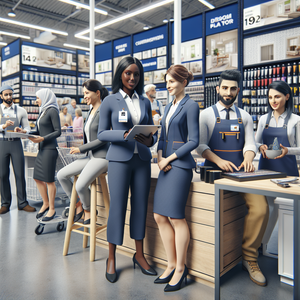The Home Depot Effect: How Retail Innovation is Shaping Home Improvement

One of the most significant innovations that Home Depot has adopted is augmented reality. The Home Depot app features an AR tool known as 'Project Color,' which allows users to visualize how different paint colors will look in their homes before making a purchase. By simply pointing their smartphones at a wall, customers can see how various shades appear in real time. This feature not only enhances the shopping experience but also reduces the likelihood of buyer's remorse, as customers can make more informed decisions about their purchases. *Example:* A customer planning to repaint their living room can test multiple colors on their actual walls using the app, saving time and money while ensuring satisfaction with their choice. This ability to preview outcomes before committing to a purchase is revolutionary in the home improvement space, where color and aesthetics play a crucial role.
Mobile Applications for Enhanced Convenience
Home Depot's commitment to innovation is further exemplified by its comprehensive mobile application, which serves as a one-stop-shop for DIY enthusiasts. The app provides users with access to product inventories, customer reviews, and how-to guides, making it easier for individuals to tackle home improvement projects. Features such as store locator, price check, and online ordering streamline the shopping process, allowing customers to save time and enhance their efficiency. *Evidence:* According to a survey conducted by the National Retail Federation, 73% of consumers prefer using mobile apps for shopping due to their convenience, which aligns perfectly with Home Depot’s strategic focus. The app not only simplifies the shopping experience but also encourages users to engage with the brand more frequently.
Impact on Consumer Behavior
The integration of advanced technologies has not only improved the shopping experience but has also significantly influenced consumer behavior. Customers are increasingly expecting seamless, tech-driven experiences when shopping, leading to a shift in how they approach home improvement projects. Home Depot's innovations cater to this demand, fostering a sense of empowerment among consumers as they navigate their home improvement journeys with confidence. *Supporting Example:* A recent case study highlighted that customers who utilized the AR features reported a 30% increase in overall satisfaction compared to those who did not use the technology. This statistic underscores the effectiveness of Home Depot's innovations in enhancing customer experiences and reinforcing their loyalty to the brand.
Setting New Industry Standards
Home Depot's pioneering use of technology is setting new benchmarks for the home improvement industry. Competitors are now compelled to adopt similar technologies or risk falling behind in a rapidly evolving market. As Home Depot continues to innovate, it not only strengthens its position as a leader but also drives an industry-wide transformation towards more tech-centric approaches. *Evidence:* A 2022 report from the Home Improvement Research Institute indicated that companies investing in digital tools and customer-centric technologies saw a 20% increase in sales compared to those that did not. This statistic not only validates Home Depot's approach but also illustrates the growing importance of technology in the retail landscape.
Home Depot's strategic embrace of technological innovation, particularly through augmented reality and mobile applications, is reshaping the landscape of home improvement retail. By enhancing the shopping experience and influencing consumer behavior, the company is not only meeting the evolving needs of its customers but also setting new standards within the industry. As technology continues to advance, it is likely that Home Depot will remain at the forefront, driving further innovation and empowering consumers to turn their home improvement dreams into reality. The Home Depot Effect is a testament to how a forward-thinking approach can transform an entire industry, proving that the future of retail lies in the seamless integration of technology and customer experience. Through these innovations, Home Depot is not just a home improvement store; it is a leader in retail evolution, showing how technology can enhance both shopping and home improvement endeavors.
Augmented Reality Developer
Home Depot, Lowe's
Core Responsibilities
Design and implement AR applications that enhance customer interactions within retail environments.
Collaborate with UX/UI designers to create intuitive user experiences for AR features, such as virtual product placements.
Conduct user testing and analyze feedback to improve AR functionalities and engagement metrics.
Required Skills
Proficiency in AR development platforms (e.g., ARKit, ARCore).
Strong background in 3D modeling software (e.g., Unity, Blender).
Experience with mobile app development (iOS and Android).
Mobile Application Product Manager
Home Depot, Best Buy
Core Responsibilities
Oversee the development and lifecycle of mobile applications, ensuring they align with business goals and user needs.
Collaborate with cross-functional teams (engineering, marketing, customer service) to prioritize features and enhancements.
Analyze app performance metrics and customer feedback to drive continuous improvements.
Required Skills
Strong understanding of mobile app analytics tools (e.g., Google Analytics, Mixpanel).
Excellent project management skills and experience with Agile methodologies.
Familiarity with user experience design principles and customer journey mapping.
User Experience Researcher
Home Depot, Wayfair
Core Responsibilities
Conduct qualitative and quantitative research to understand user behavior and preferences in home improvement contexts.
Develop user personas and journey maps to inform design decisions for technology-driven solutions.
Collaborate with design and product teams to translate research findings into actionable insights and recommendations.
Required Skills
Proficiency in research methodologies, including usability testing, surveys, and interviews.
Strong analytical skills and experience with data analysis tools (e.g., SPSS, Tableau).
Excellent communication skills to present findings to stakeholders.
E-commerce Strategy Analyst
Home Depot, Target
Core Responsibilities
Analyze market trends, consumer behavior, and sales data to develop strategic recommendations for online sales growth.
Monitor competitor activities and industry developments to identify opportunities for innovation.
Collaborate with marketing and product management teams to optimize the online shopping experience.
Required Skills
Strong analytical skills with experience in data visualization tools (e.g., Power BI, Google Data Studio).
Knowledge of SEO, online marketing strategies, and conversion rate optimization.
Experience in the home improvement sector or retail analytics is a plus.
Digital Marketing Specialist – Home Improvement
Home Depot, Lowe's
Core Responsibilities
Develop and execute digital marketing campaigns that promote home improvement products and services.
Utilize SEO, email marketing, and social media strategies to enhance brand visibility and drive traffic to the website.
Analyze campaign performance metrics and adjust strategies based on data-driven insights.
Required Skills
Proficiency in digital marketing tools (e.g., Google Ads, Facebook Ads Manager).
Strong creative writing skills for content creation and copywriting.
Familiarity with home improvement trends and consumer interests in the industry.


